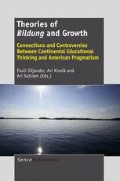Abstract
John Dewey (1859-1952) is generally acknowledged as one of the most pivotal philosophers in the early American pragmatism. Dewey's thinking was closely bound up with the specific time period in which he lived. The elaboration of his philosophical ideas proceeded along the transformation of United States from rural to urban, industrial society still rooted in modern European tradition of thought and its critics.
Access this chapter
Tax calculation will be finalised at checkout
Purchases are for personal use only
Preview
Unable to display preview. Download preview PDF.
References
Childs JL. The educational philosophy of John Dewey. In: Schilpp PA, Hahn LE, editors. The Philosophy of John Dewey. Carbodale: Souther Illinois University; 1989. p. 419–443.
Cleve, Z. J. (1886). Koulujen Kasvatusoppi. Helsinki.
Biesta G. J. J. (1995). Pragmatism as a pedagogy of communicative action. In J. Garrison (Ed.), The New Scholarship on Dewey (pp. 105–122). Dortdrecht: Kluwer Academic Publishers.
Biesta, G. J. J. (2006). “Of all affairs, communication is the most wonderful” The communicative turn in Dewey’s Democracy and Education. In D. T. Hansen (Ed.), John Dewey and our Educational Prospect (pp. 23–37). Albany, NY: SUNY Press.
Biesta GJJ, Burbules CN. Pragmatism and Educational Research. Lanham, Boulder, New York, Toronto, Oxford: Rowan & Littlefield publishers, Inc.; 2003.
Dewey, J. (1973). (orig. 1884). Pragmatism's Dept to Hegel. In W. H. Goetzmann (Ed.), The American Hegelians: An Intellectual Episode in the History of Western America (pp. 149–153). NY: Knopf. Originally published in Journal of Speculative Philosophy 18, 170–173.
Dewey, J. (1965). (orig. 1904). The relation of theory to practice in education. In M. L. Borrowman (Ed.), Teacher Education in America. A Documentary History (pp. 140–171). New York: Teachers College Press.
Dewey, J. (1980a). (orig. 1916). Democracy and education. In J. A. Boydston (Ed.), John Dewey, The Middle Works: 1899–1924. Carbondale & Amsterdam: Southern Illinois University Press.
Dewey, J. (1980b). (orig. 1925). The development of American pragmatism. In J. A. Boydston (Ed.), John Dewey, The Later Works, 1925–1953. Carbondale: Southern Illinois University Press.
Dewey, J. (1987a). (orig. 1917). Need for a recovery of philosophy. In J. A. Boydston (Ed.), John Dewey The Middle Works, 1899–1924. Carbondale: Southern Illinois University Press.
Dewey, J. (1987b). (orig. 1938). Experience and education. In J. A. Boydston (Ed.), John Dewey, The Later Works, 1925–1953. Carbondale: Southern Illinois University Press.
Dewey, J. (1987c). (orig. 1896). The reflex arc concept of psychology. In J. A. Boydston (Ed.), John Dewey, The Early Works, 1882–1898. Carbondale: Southern Illinois University Press.
Dewey, J. (1988a). (orig.1922). Human nature and conduct. In J. A. Boydston (Ed.) John Dewey The Middle Works. 1899–1924. Carbondale: Southern Illinois University Press.
Dewey J. (orig.1927). The public and its problems. In: Boydston JA, editor. John Dewey, The Later Works, 1925–1927. Carbondale: Southern Illinois University Press; 1988b.
Dewey, J. (1988c). (orig. 1925). Experience and nature. In J. A. Boydston (Ed.), John Dewey, The Later Works, 1925–1953. Carbondale: Southern Illinois University Press.
Dewey, J. (1988d). (orig. 1920). Reconstruction in philosophy. In J. A. Boydston (Ed.), John Dewey The Middle Works, 1899–1924. Carbondale: Southern Illinois University Press.
Dewey J. (orig.1929). The quest for certainty: A study of the relation of knowledge and action. In: Boydston JA, editor. John Dewey The Later Works, 1925–1953. Carbondale: Southern Illinois University Press; 1990a.
Dewey, J. (1990b). (orig. 1900). The School and Society. Chicago: The University of Chicago Press.
Dewey, J. (1991a). (1910). How We Think. Buffalo: Prometheus Books.
Dewey, J. (1991b). (orig. 1938). Logic: The theory of inquiry. In J. A. Boydston (Ed.), John Dewey, The Later Works, 1925–1953. Carbondale: Southern Illinois University Press.
James, W. (1948). (orig. 1907). Pragmatism's conception of truth. In W. James (Ed.), Essays in Pragmatism (pp. 159–176). New York: Hafner Press.
James, W. (1978). (orig. 1907). Pragmatism. A New Name for Some Old Ways of Thinking. Massachusetts: Harvard University Press.
Joas H. Mead's position in intellectual history and his early philosophical writings. In: Aboulafia M, editor. Philosophy Social Theory, and the Thought of George Herber Mead. Albany: State University of New York Press; 1991. p. 57–86.
Kilpatric WH. Dewey's influence on education. In: Schilpp PA, Hahn LE, editors. The Philosophy of John Dewey. Carbondile: Southern Illinois University; 1989. p. 447–473.
Mead, G. H. (1964). (orig. 1930). The philosophies of Royce, James, and Dewey in their American setting. In A. J. Reck (Ed.), Selected Writings. Georg Herbert Mead (pp. 371–407). Chicago and London: The University of Chicago Press.
Peirce, C. S. (1955). Philosophical Writings of Peirce (J. Buchler, Ed.). New York: Dover Publications.
Russell, B. (1961). The Basic Writings of Bertrand Russell. 1903-1959 (R. E. Egner & L. E. Denonn, Eds.). NY: Simon and Schuster.
Ratner, J. (1989). Dewey's conception of philosophy. In P. A. Schilpp & L. E. Hahn (Eds.), The Philosophy of John Dewey (pp. 49–73).
Rosenthal S. Democracy and education: A Dewyan approach. Educational Theory. 1993;43(1):377–389.
West C. The American Evasion of Philosophy. A Genealogy of Pragmatism. Madison: The University of Wisconsin Press; 1989.
Rights and permissions
Copyright information
© 2012 Sense Publishers
About this chapter
Cite this chapter
Juuso, H. (2012). The Origins and Educational Significance of John Dewey's Philosophy. In: Theories of Bildung and Growth. SensePublishers, Rotterdam. https://doi.org/10.1007/978-94-6209-031-6_15
Download citation
DOI: https://doi.org/10.1007/978-94-6209-031-6_15
Publisher Name: SensePublishers, Rotterdam
Online ISBN: 978-94-6209-031-6
eBook Packages: Humanities, Social Sciences and LawEducation (R0)

